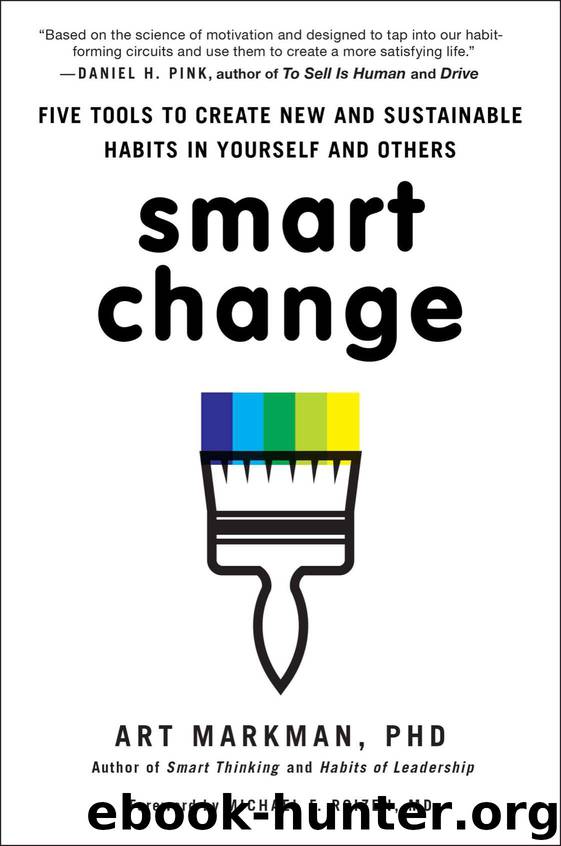Smart Change: Five Tools to Create New and Sustainable Habits in Yourself and Others by Art Markman PhD

Author:Art Markman PhD
Language: eng
Format: mobi
Publisher: Penguin Publishing Group
Published: 2014-01-06T14:00:00+00:00
Call on Your Reserves
The overriding message so far in this chapter is that the Stop System has limited resources and is generally fallible. While that is true, it is also important to bear in mind that your beliefs about the effectiveness of the Stop System will actually affect how well you are able to stop yourself from giving in to temptation.
The research of Carol Dweck and her colleagues focuses on the distinction between talents and skills. Talents are abilities that you are born with. You may be able to improve on those talents with practice, but your ability to achieve is limited primarily by your level of talent rather than the effort you put in. Skills are abilities that depend mostly on effort. Even if you start out doing these things badly, with enough time, effort, and practice, you can come to be expert in them. Dweck considers whether you think various abilities are talents (in which case you hold what she calls an entity mind-set about the ability) or a skill (in which case you hold an incremental mind-set).
Research suggests there is a strong skill component to almost anything in life. That is, you can improve almost anything with hard work and practice. This is true for things ranging from music to art, sports, intelligence, and computer programming. For any of those abilities, you may have some natural talent. When you first sit down at a piano, you may immediately be able to pick out a song or it may take a while before anything resembling music comes from it. But your ultimate ability to play that instrument will depend primarily on the amount of time you spend working at it and not on some innate talent.
Even though almost everything is a skill and not a talent, people tend to believe the opposite. When we see a great musician play a concert, we marvel at her talent. When we read about a new invention, we are impressed by how smart the inventor had to be. We assume that these individuals had some spark that we ourselves did not have. And that spark allowed them to achieve greatness. In other words, we often believe in talents when we should believe in skills.
From what I have said so far in this book, it would seem that the Stop System is a great example of a talent. You have some fixed ability to engage the Stop System, and when it is pushed to its limits it is bound to fail. It turns out, though, that your beliefs about the Stop System affect how well it works.
Research suggests that if you adopt an incremental mind-set about the Stop System and treat it like a skill, then you are better able to overcome temptation than if you have an entity mind-set. That is, if you believe that willpower is a bit like a muscle that can strain to overcome difficult temptations and can get stronger with use, then you do a better job with temptation than if you believe that your capacity for willpower is fixed.
Download
This site does not store any files on its server. We only index and link to content provided by other sites. Please contact the content providers to delete copyright contents if any and email us, we'll remove relevant links or contents immediately.
The Complete Stick Figure Physics Tutorials by Allen Sarah(7363)
Secrets of Antigravity Propulsion: Tesla, UFOs, and Classified Aerospace Technology by Ph.D. Paul A. Laviolette(5365)
Thing Explainer by Randall Munroe(3930)
The River of Consciousness by Oliver Sacks(3599)
The Order of Time by Carlo Rovelli(3188)
How To by Randall Munroe(3105)
A Brief History of Time by Stephen Hawking(3022)
I Live in the Future & Here's How It Works by Nick Bilton(2993)
What If?: Serious Scientific Answers to Absurd Hypothetical Questions by Randall Munroe(2700)
The Great Unknown by Marcus du Sautoy(2690)
Midnight in Chernobyl by Adam Higginbotham(2541)
Blockchain: Ultimate Step By Step Guide To Understanding Blockchain Technology, Bitcoin Creation, and the future of Money (Novice to Expert) by Keizer Söze(2484)
Networks: An Introduction by Newman Mark(2404)
The Meaning of it All by Richard Feynman(2350)
Easy Electronics by Charles Platt(2325)
The Tao of Physics by Fritjof Capra(2272)
Midnight in Chernobyl: The Untold Story of the World's Greatest Nuclear Disaster by Adam Higginbotham(2222)
Introducing Relativity by Bruce Bassett(2115)
When by Daniel H Pink(2113)
